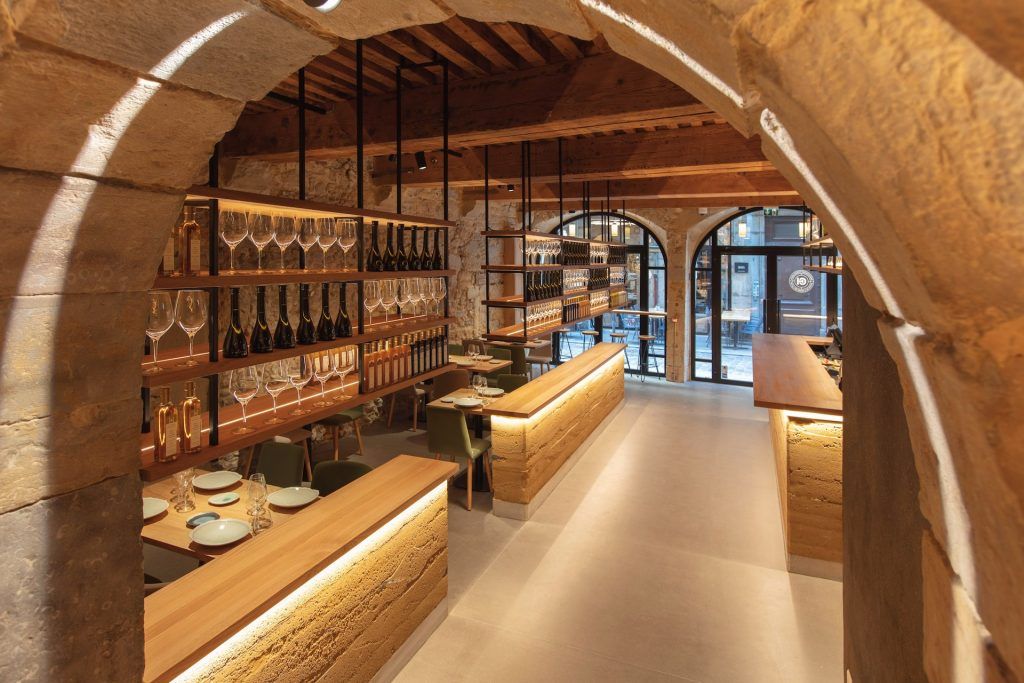
Those who participated in the Veganuary challenge this January may have experienced new dishes and new flavours as they embarked on this way of eating. With many of us striving to continue to eat more plant-based meals and to make them part of special occasion dining too, one question inevitably comes up: what kind of wine pairings work best with vegetarian food.
To get some answers, we turned to Jeanne Suscillon, sommelier at Culina Hortus in Lyon, France, which was named best vegetarian restaurant in the world in 2020 by the We’re Smart Green Guide, who talked us through some of the French wines that work well with their vegetarian cuisine.

It can be hard for non-professionals to pair wine and food in the first place. Isn’t finding the right wine match for plant-based cuisine even harder?
Jeanne Suscillon: In general the focus is on the aromatic aspect, and we often think of pairing white wine with fish or red wine with red meat. With plant-based cuisine, we’re interested in other parameters which non-professionals generally pay less attention to, such as acidity, bitterness, fullness and mouthfeel. We can also look for tannins that can bring bitter flavors, which provides a very interesting context to work with for plant-based dishes. Be careful with this option because many vegetables also bring bitterness and then it can become too astringent in the mouth.
In wine pairing, there is this rule of matching colours and tones, which consists in relying on the tone of the dish to choose a wine with a similar shade, red wine with a beet dish, for example. Is this a good idea for vegetarian cuisine?
This is a great principle to follow! It’s very practical when you’re an amateur. However, you shouldn’t overdo it, otherwise you may end up choosing a lot of white wines.
Given its mineral and/or floral structure, white wine is indeed the most obvious choice, isn’t it?
Currently, at lunchtime we’re serving an appetiser featuring nasturtium and kumquat. The nasturtium is used with root and leaf. It brings a lot of acidity, with nice bitter flavours and some texture in the mouth. For the kumquat, there is a clear emphasis on bitterness. Here, we propose a pairing that plays with acidity, namely a young Riesling to provide a freshness that combines well with bitterness and acidity. This rinses the palate, which is not unpleasant given the heady quality of the nasturtium. In contrast, the next dish is made with crosnes and mushrooms. It’s an earthy combination, which calls for a red wine. I’m careful not to choose a tannic bottle, to avoid bitterness.
Which vegetarian or plant-based foods can red wine be paired with?
When I’m looking for sweet accents, like in a pumpkin-based dish, I opt for juicy wines, with texture. You can choose wines from Languedoc, Collioure, in short, wines from the south that maintain a fruitiness and give an impression of sweet and savory.
Is a plant-based meal an occasion to bring out one of our great cellar-aged wines?
The polished tannins of a red wine lend themselves very well to vegetarian dishes. For one of our previous dishes with smoked lentils and truffles, I brought out a 2012 vintage Côte-Rôtie wine. The leather and cocoa flavors of this wine worked very well.
When the weather is warm and the sun is out, what type of rosés pair well with plant-based dishes?
Look for well-honed, refined rosés. I’m thinking in particular of the Hauvette estate, which is located in the Alpilles, and whose Petra vintage is based partly on rosé de saignée [the juice is drawn off from a vat intended to produce red wine, editor’s note], which brings structure. It can therefore be used very well in a pairing.
Are natural or biodynamic wines better choices insofar as they’re created without too much human intervention and therefore taste more of nature?
Not necessarily. A nice wine that reveals nice signs of aging and draws one of its aromatic assets from the wood, can be useful in creating a pairing with certain vegetables. In Burgundy, white wines that have a buttery aroma are perfect to serve with roasted root vegetables for example.
What about pairings for vegan dishes?
When our kitchen team builds a menu, they try to use as many non-animal ingredients as possible so that we can more easily offer a vegan version to our clients, making it easier to adapt. As a result, the pairings we offer are similar in principle to vegetarian cuisine. That said, many customers who opt for the vegan menu don’t ask about the wine to see if the pairings are vegan too… Consumers aren’t very informed about the fact that some wines [come in contact] with fishtail or bone.
Culina Hortus is located at 38, rue de l’Arbre sec, 69001 Lyon
This interview has been translated from French and was published via AFP Relaxnews
(Main image: Andrea Piacquadio/ Pexels; Featured image: Vladimir Gladkov/ Unsplash)
an update!
You’re all set
Thank you for your subscription.
Subscribe to our newsletter to get the latest updates.
You’re all set
Thank you for your subscription.


